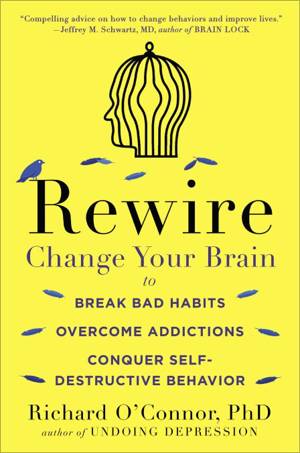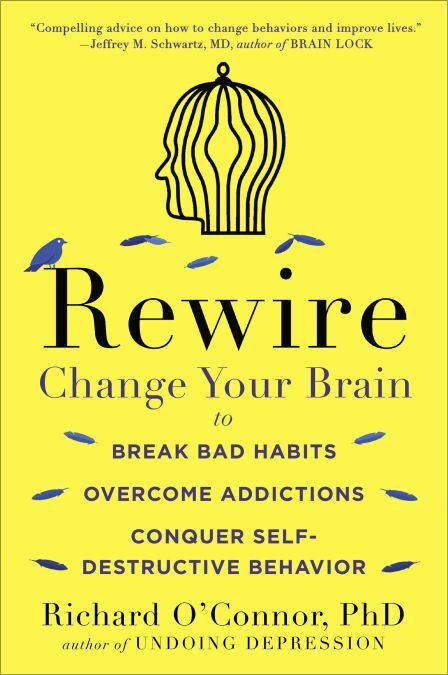
- Afhalen na 1 uur in een winkel met voorraad
- Gratis thuislevering in België vanaf € 30
- Ruim aanbod met 7 miljoen producten
- Afhalen na 1 uur in een winkel met voorraad
- Gratis thuislevering in België vanaf € 30
- Ruim aanbod met 7 miljoen producten
Zoeken
Rewire E-BOOK
Change Your Brain to Break Bad Habits, Overcome Addictions, Conquer Self-Destructive Behavior
Richard O'Connor
E-book | Engels
€ 8,06
+ 8 punten
Uitvoering
Omschrijving
A refreshing guide to becoming a healthier, happier self.
We humans tend to get in our own way time and time again—whether it comes to not speaking up for ourselves, going back to bad romantic partners, dieting for the umpteenth try, or acting on any of a range of bad habits we just can’t seem to shake. In Rewire, renowned psychotherapist Richard O’Connor, PhD, reveals exactly why our bad habits die so hard. We have two brains—one a thoughtful, conscious, deliberative self, and the other an automatic self that makes most of our decisions without our attention. Using new research and knowledge about how the brain works, the book clears a path to lasting, effective change for behaviors that include:
• Procrastination
• Overeating
• Chronic disorganization
• Staying in bad situations
• Excessive worrying
• Risk taking
• Passive aggression
• Self-medication
Bringing together many different fields in psychology and brain science, Dr. O’Connor gives you a road map to overcoming whatever self-destructive habits are plaguing you, with exercises throughout the book. We can rewire our brains to develop healthier circuitry, training the automatic self to make wiser decisions without having to think about it; ignore distractions; withstand temptations; see ourselves and the world more clearly; and interrupt our reflexive responses before they get us in trouble. Meanwhile, our conscious minds will be freed to view ourselves with compassion at the same time as we practice self-discipline. By learning valuable skills and habits—including mindfulness, self-control, confronting fear, and freeing yourself from mindless guilt—we can open ourselves to vastly more successful, productive, and happy lives.
We humans tend to get in our own way time and time again—whether it comes to not speaking up for ourselves, going back to bad romantic partners, dieting for the umpteenth try, or acting on any of a range of bad habits we just can’t seem to shake. In Rewire, renowned psychotherapist Richard O’Connor, PhD, reveals exactly why our bad habits die so hard. We have two brains—one a thoughtful, conscious, deliberative self, and the other an automatic self that makes most of our decisions without our attention. Using new research and knowledge about how the brain works, the book clears a path to lasting, effective change for behaviors that include:
• Procrastination
• Overeating
• Chronic disorganization
• Staying in bad situations
• Excessive worrying
• Risk taking
• Passive aggression
• Self-medication
Bringing together many different fields in psychology and brain science, Dr. O’Connor gives you a road map to overcoming whatever self-destructive habits are plaguing you, with exercises throughout the book. We can rewire our brains to develop healthier circuitry, training the automatic self to make wiser decisions without having to think about it; ignore distractions; withstand temptations; see ourselves and the world more clearly; and interrupt our reflexive responses before they get us in trouble. Meanwhile, our conscious minds will be freed to view ourselves with compassion at the same time as we practice self-discipline. By learning valuable skills and habits—including mindfulness, self-control, confronting fear, and freeing yourself from mindless guilt—we can open ourselves to vastly more successful, productive, and happy lives.
Specificaties
Betrokkenen
- Auteur(s):
- Uitgeverij:
Inhoud
- Aantal bladzijden:
- 304
- Taal:
- Engels
Eigenschappen
- Productcode (EAN):
- 9780698156968
- Verschijningsdatum:
- 30/07/2014
- Uitvoering:
- E-book
- Beveiligd met:
- Adobe DRM
- Formaat:
- ePub

Alleen bij Standaard Boekhandel
+ 8 punten op je klantenkaart van Standaard Boekhandel
Beoordelingen
We publiceren alleen reviews die voldoen aan de voorwaarden voor reviews. Bekijk onze voorwaarden voor reviews.








